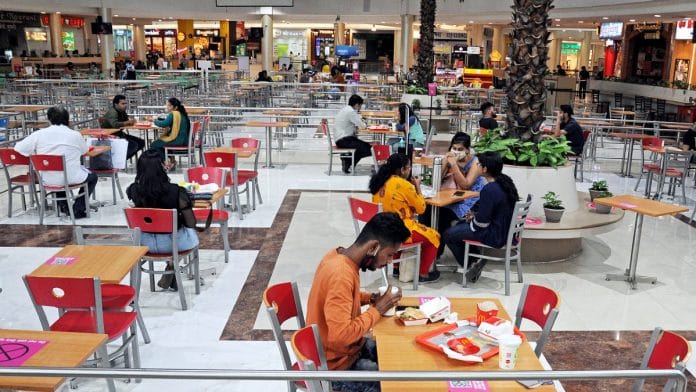New Delhi: At least 14.7 per cent of Jain men and 4.3 per cent of Jain women in India consume fish, chicken and meat, fifth round of the National Family and Health Survey (NFHS) has revealed.
Since the tenets of Jainism equate meat-eating to a form of violence, most followers of Jainism – one of the world’s oldest religions – are known to adhere to a strict vegetarian diet, which excludes even onion, garlic and other root vegetables.
The survey noted that compared to NFHS-4 (2015-2016), the intake of fish, chicken and meat among Jain men jumped from 3.5 per cent to 14.7 per cent, while the same dipped in the case of Jain women, from 8.6 per cent to 4.3 per cent.
NFHS is a large-scale, multi-round survey conducted by the Centre involving a representative sample of households across India. The latest edition was carried out between 2019 and 2021 and gives a peek into the country’s socio-economic realities, health and nutrition by compiling district-level estimates on such subjects.
The sample size of NFHS-5 comprised 6.37 lakh sample households in 707 districts in 28 states and 8 UTs, covering 7,24,115 women and 1,01,839 men through the use of questionnaires. The eligible age group for adult men and women is 15-49 years for which the food consumption data is available.
Data on food consumption among Indians has also shown that eggs are part of the diet of about 11 per cent of Jain men and 6.7 per cent of Jain women.
This data contrasts administrative and political measures such as the Ludhiana administration banning the sale of eggs and meat on the Jain festival Paryushan or the Madhya Pradesh government refusing to allow eggs to be part of mid-day meals for school children, citing that it will hurt sentiments of the Jain community.
Non-vegetarianism among Jains, however, is still lower than among the Hindu population – 52.5 per cent of Hindu men and 40.7 per cent of Hindu women eat fish, chicken and meat. Additionally, 54.5 per cent of Hindu men and 41.5 per cent of Hindu women consume eggs as part of their diet, as per NFHS-5.
Furthermore, NFHS-5 data defies the myth that India is largely a nation of vegetarians. According to the survey, 83.4 per cent of Indian men and 70.6 per cent of Indian women in the 15-49 age group consume non-vegetarian food either daily, weekly or occasionally.
This signifies an upward trend in non-vegetarianism among Indian men compared to NFHS-4, that pegged consumption of non-vegetarian food among Indian men at 78.4 per cent and among Indian women at 70 per cent.
(Edited by Amrtansh Arora)
Also Read: Blame it on Covid: Fewer Indians taking to booze, those who drink are drinking more, finds NFHS






